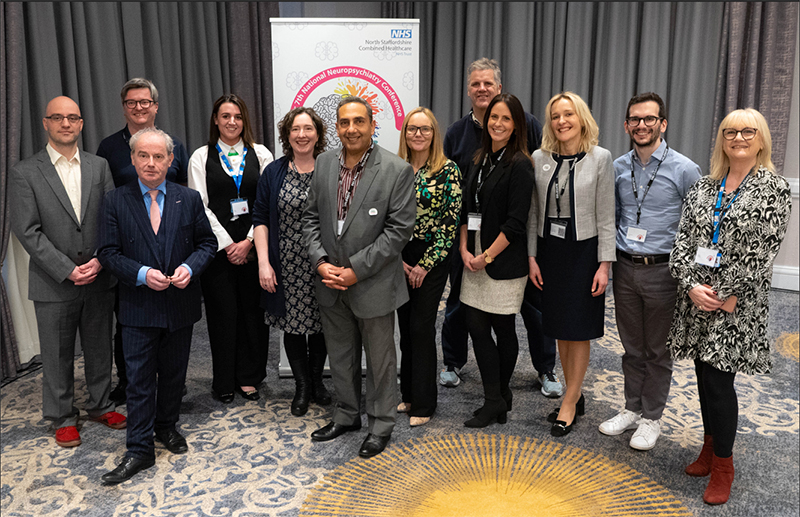
The Doubletree Hilton Hotel in Stoke-On-Trent set the stage for North Staffordshire Combined Healthcare NHS Trust to host their 7th National Neuropsychiatry Conference with a theme of ‘Brain and Behaviour’. The event attracted over 170 delegates.
Opening the event was the Trust’s Chief Medical Officer, Dr Dennis Okolo who emphasised the importance of neuropsychiatry for all psychiatric subdivisions.
Dr George El-Nimr, Consultant Neuropsychiatrist, the first speaker and organiser of the conference, spoke about the ‘Neuropsychiatry of cognitive disorders’ giving a clinical overview of the importance of accurately diagnosing someone’s cognitive deficit. He emphasised challenges in formulating this patient group including the role of clinical interview, collateral history, standardised cognitive testing, laboratory testing and neuroimaging.
The introduction of neuroimaging foreshadowed the next talk by Dr David Bailey, Consultant Nuclear Radiologist. Dr Bailey talked us through radioactive labelling in the diagnosis of dementias, further emphasising Dr El-Nimr’s assertion of the significance of establishing the correct diagnosis. He presented brain radiographs using this technique and pointed out some of the challenges in producing these and the need for standardisation.
Lauren Beck and James Piercy had a powerful conversation on stage about their own experiences of traumatic brain injury. James spoke of his personal brain injury and how that led him to bring needed attention to others suffering from brain injury, through his public speaking and advocacy. Lauren spoke of her younger brother’s brain injury and the personality changes he went through during his recovery. The juxtaposition with the clinical talks reminded delegates of how neuropsychiatry translates to lived experience.
Brainland is a project started by Dr Ken Barrett, a retired neuropsychiatrist who founded the neuropsychiatric services in Stoke-On-Trent. This is a creative project which has cultivated in the depiction of important historical moments in neuropsychiatry through opera, specifically delegates witnessed a scene between Gottlieb Burckhardt, a Swiss Psychiatrist, and Egas Moniz, a Portuguese Neurologist, where they discussed the arrangements for the first leucotomies.

Leading conference delegates through the patient experience of alcohol related brain injury, Professor Kenneth Wilson, Consultant Old Age Psychiatrist, jested around the irony of his training in old age and his clinical practice seeing him working with younger adults who suffered from cognitive disorders. His work illustrated the destructive nature of alcohol on the brain with the subsequent risk of losing independence and reduced life expectancy.
Following lunch, the afternoon offered parallel sessions. Dr Buno Silva, Consultant Neuropsychiatrist, spoke about his approach towards the adult patient complaining of fatigue and how one would go about considering diagnoses such as chronic fatigue syndrome. He included when diagnostic laboratory tests become useful, understanding the potential aetiologies and managements for this condition.
Professor Hugh Rickards, Consultant Neuropsychiatrist, led an interactive workshop, inspired by the BBC radio 4 show ‘It’s a fair cop’, seeing delegates led through a medico-legal case about the controversial detainment of a patient with Huntington’s disease against their will. He explored the interface between psychiatry and the law and the intricacies in teasing out a patient’s capacity in a situation where frontal lobe dysfunction predominates.
Dr Thomas Lambert, Consultant Neurologist, reflected upon the somewhat overlooked aspects of epilepsy which are the behavioural changes associated with the condition. He also highlighted the importance of considering the side effects of anti-epileptic medications that can induce behavioural changes, particularly worsening aggression with drugs like levetiracetam.
Sleep disruption is a common problem. When this disruption is beyond the patient’s control, insomnia can ensue. Associated depression, suicidality, cardiovascular risk, mortality and increased absenteeism from work make the problem ever more pertinent to society. Dr Ruta Kontautaite, Consultant Neuropsychiatrist, discussed how to recognise insomnia and relevant pharmacological and cognitive behavioural therapies for its treatment.
Returning from the workshops and back to one group, a legal perspective on ‘The Injured brain in the courtroom’ was given by Mr Doug Feery, Barrister for Liverpool Civil Law. Mr Feery elucidated the nuances within the mental health act and capacity act demonstrating, with case studies, how a cognitively compromised individual is affected by the legal scrutiny in these statutes, including consenting to sex, financial power, housing among other things.
Dr Mary O’Driscoll, Consultant Clinical Geneticist, started her talk with a heeding of the need not to be an expert in genetics to understand the role it is going to play in psychiatry over the next decade. She highlighted the importance of taking a three generational family history to help identify the need for genetic testing. With this she talked delegates through the limitations in genetic testing and the importance of genetic counselling beforehand.
Finally, Professor Roger Barker, Professor of Clinical Neuroscience and Consultant Neurologist, presented the changes in the recent understanding of the aetiology of both Parkinson’s disease (PD) and Huntington’s disease (HD) and how this has translated into honing the interest in developing new therapies. These include repurposing alpha synuclein immunotherapies in PD and new approaches to target mutant huntingtin in HD.
In concluding the conference, one is left reminded of the true multidisciplinary nature of neuropsychiatry and the empowerment that can be directly transferred to patients as a result of this cohesion. Delegates were engaged, questioned the speakers, interacted within the sessions, and the broad range of topics within the field and background of the speakers kept the day both didactic and enjoyable.